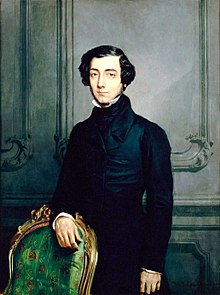 |
| Alexis de Tocqueville |
The above quote sounds like a description of our modern "political correctness", doesn't it? We can easily see these words applied to dozens of situations concerning our current government and media. But this sentence was not written within the past few years, nor even within the past few decades. It was written by a Frenchman named Alexis de Tocqueville, who visited America in 1831.
Tocqueville was a man of remarkable insight. Born into post-Revolution France to aristocratic parents, he was keenly aware of his country's struggle towards democracy, and saw both the good and the evil that it could bring. He was especially fascinated by America, it being, in his eyes, the most completely democratic country in the world. In 1831 he travelled to America to study the government and the people there, and eventually wrote a book based on his observations and reflections, called Democracy in America.
By his writing it is easy to tell that Tocqueville is a supporter of democracy, but he is by no means a blind supporter. He knows that a democracy can be as tyrannical as a monarchy if it is immoral:
Fetters and headsmen were the coarse instruments that tyranny formerly employed; but the civilization of our age has perfected depotism itself, though it seemed to have nothing to learn. Monarchs had, so to speak, materialized oppression; the democratic republics of the present day have rendered it as entirely an affair of the mind as the will which it is intended to coerce. Under the absolute sway of one man the body was attacked in order to subdue the soul; but the soul escaped the blows which were directed against it and rose proudly superior. Such is not the course adopted by tyranny in democratic republics; there the body is left free, and the soul is enslaved. The master no longer says: "You shall think as I do or you shall die;" but he says: "You are free to think differently from me and to retain your life, your property, and all that you possess; but you are henceforth a stranger among your people. You may retain you civil rights, but they will be useless to you, for you will never be chosen by your fellow citizens if you solicit their votes; and they will affect to scorn you if you ask for their esteem. You will remain among men, but you will be deprived of the rights of mankind. Your fellow creatures will shun you like an impure being; and even those who believe in your innocence will abandon you, lest they should be shunned in their turn. Go in peace! I have given you your life, but it is an existence worse than death." (Democracy in America, "Unlimited Power of the Majority in the United States, and Its Consequences")
Tocqueville later admitted in the same article that this tendency of democratic tyranny was only "slightly perceptible" in America as yet, but that it was already a bad influence. Nineteenth-century Americans scoffed at Tocqueville's warning, but now it's a warning that is coming true. Anyone, especially, who is a supporter of traditional morality or the Catholic Church, is now subject in this country to vicious attack by the media.
Tocqueville knew that any form of government, democracy or monarchy, cannot long survive if it is not moral. Liberty is America's claim to fame; but when America begins attacking morality, it is only destroying its most precious possession. For true liberty can never exist without morality.
No comments:
Post a Comment